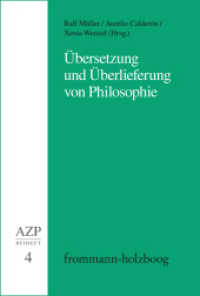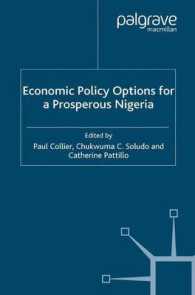- ホーム
- > 洋書
- > 英文書
- > Philosophy
Full Description
The capacity for reasonable argument about practical and political matters is important to our daily lives. Yet what does arguing really involve? Often, our very concept of what it is to argue seems systematically distorted. Practical, political arguing is too often stylized as hyper-cognitive, ending by treating people as objects rather than other selves - in ways that are fundamentally unreasonable. This book examines what follows from seeing people as deliberating and acting in ways that intertwine a variety of emotional and evaluative processes and effects of virtue or character. From this point of view, practical arguing involves not just cognition, emotion, and virtue, but also practices, including imaginative practices. Politics of Practical Reasoning: Integrating Action, Discourse and Argument uses these ideas to interrogate ways in which reasoning is bound up with the interrelated lives that human beings lead in their everyday, public and political worlds.We build here on efforts to re-concretize practical reasoning in modern traditions linked to phenomenology and Wittgensteinian thought, also referring back to Aristotle and the Stoics in classical times. Medieval theologians and philosophers such as Aquinas confront the same issue, as do Enlightenment thinkers such as Smith and Kant. Using the history of philosophical thought as one of our major sources, the contributors sympathize with the link underscored between interpretation, tradition and reasoning by Gadamer, the stress placed on communicative and emancipatory action by Habermas, and MacIntyre's notion of praxis as highlighting deliberation within communities. All these approaches respond to practical reasoning as practical. Building on these points of view, the volume both explores what practical reasoning itself means, and applies it to particular questions: what it means to respond to arguments about meaningful work or disability, or how to debate institutional ethics or art. None of these debates is susceptible to exclusively cognitive or technical solutions; this does not mean abandoning them to unreason.Practical and political reasoning is examined here from an appropriately broad spectrum of approaches, founded in a concern for what human reasoning can justifiably be expected to involve, and what justifying it can reasonably be expected to achieve.
Contents
IntroductionRicca Edmondson and Karlheinz HulserSection 1. Fundamental Structures of Practical ReasoningChapter 1: Aristotle's Political AnthropologyFran O'RourkeChapter 2: Pragmatics and the Idea of the Illocutionary in Stoic Language TheoryKarlheinz HulserChapter 3: Utrum gratitudo sit virtus moralis vel passio animae or: Gratitude-an Aristotelian Virtue or an Emotion?Thomas NistersChapter 4: Seeing Ourselves as Others See Us: The Place of Reason in Adam Smith's Theory of Moral SentimentsGerard CaseyChapter 5: Reasons to Act and Practical ReasoningThomas GilSection 2. Developing Convincing ArgumentsChapter 6: Practical Reasoning in Place: Tracing "Wise" Inferences in Everyday LifeRicca EdmondsonChapter 7: Toulmin's Rhetorical LogicFrank CanovanChapter 8: Reason, Production, and Rival Visions of Working LifeKeith BreenChapter 9: Reasoning About Disability in the Light of Advances in TechnologyRichard HullChapter 10: Principles in Practice: Reasoning with Principles in Biomedical EthicsHeike FelzmannSection 3. Engagement for the Practical Unity of LifeChapter 11: The Theory of Double Truth RevisitedKarsten HarriesChapter 12: Philosophia sine qua non: John Rawls' transcendental-political reflectionsSebastian LallaChapter 13: Sceptical Wisdom: Descartes, Pascal and the Challenge of PyrrhonismFelix O'MurchadhaChapter 14: Art as "Organizer" of Life: the Case of Jackson PollockElizabeth LanghorneAfterword: Signs, Bodies, ArtworksTerry Eagleton








